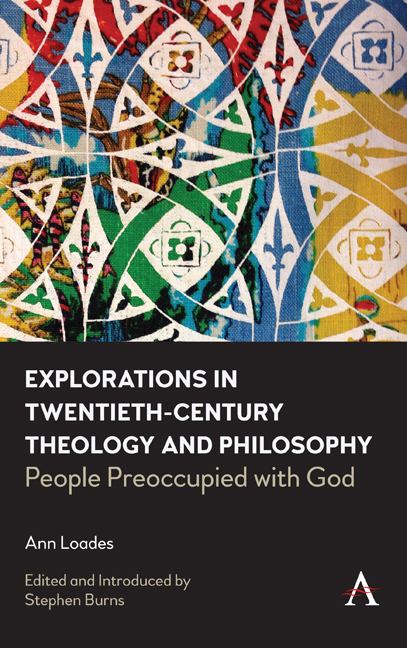Book contents
- Frontmatter
- Contents
- A Personal Note
- Foreword
- Introduction: The Grace of Intelligence
- Chapter One Evelyn Underhill (1875–1941): Mysticism and Worship
- Chapter Two Evelyn Underhill: As Novelist – Exploring Mysticism
- Chapter Three Dorothy L. Sayers (1893–1957): War and Redemption
- Chapter Four Dorothy L. Sayers: Are Women Human? Considering Dante’s Beatrice
- Chapter Five C. S. Lewis (1898–1963): On Gender
- Chapter Six C. S. Lewis: On Grief
- Chapter Seven Austin Farrer (1905–1968): Love Almighty and Ills Unlimited
- Chapter Eight Austin Farrer: And Friends
- Chapter Nine Simone Weil (1909–1943): Resistance and Writing
- Chapter Ten Simone Weil: Eucharistic Sacrifice – Exploring a Metaphor
- Chapter Eleven Stephen Sykes (1939–2014) and Colleagues: Exploring the Problematic Legacy of Power
- Afterword: The Passionate Intellect of Ann Loades
- Acknowledgements
- Bibliography
- Contributors
- Index
Chapter Two - Evelyn Underhill: As Novelist – Exploring Mysticism
Published online by Cambridge University Press: 18 November 2023
- Frontmatter
- Contents
- A Personal Note
- Foreword
- Introduction: The Grace of Intelligence
- Chapter One Evelyn Underhill (1875–1941): Mysticism and Worship
- Chapter Two Evelyn Underhill: As Novelist – Exploring Mysticism
- Chapter Three Dorothy L. Sayers (1893–1957): War and Redemption
- Chapter Four Dorothy L. Sayers: Are Women Human? Considering Dante’s Beatrice
- Chapter Five C. S. Lewis (1898–1963): On Gender
- Chapter Six C. S. Lewis: On Grief
- Chapter Seven Austin Farrer (1905–1968): Love Almighty and Ills Unlimited
- Chapter Eight Austin Farrer: And Friends
- Chapter Nine Simone Weil (1909–1943): Resistance and Writing
- Chapter Ten Simone Weil: Eucharistic Sacrifice – Exploring a Metaphor
- Chapter Eleven Stephen Sykes (1939–2014) and Colleagues: Exploring the Problematic Legacy of Power
- Afterword: The Passionate Intellect of Ann Loades
- Acknowledgements
- Bibliography
- Contributors
- Index
Summary
A walk through the graveyard of the Parish Church of St John-at-Hampstead will discover a gravestone for Hubert and Evelyn Stuart Moore, the tablet further identifying her as the daughter of Sir Arthur Underhill. This memorial in effect relegates Evelyn Underhill (1875–1941) to the roles of daughter and wife, containing no indication that she had received public recognition in her own right for her remarkable career. A major feature of this was becoming a ‘retreat director’, a vocation which, in the Church of England, was one she pioneered for women. As early as 1913 Underhill was made an Honorary Fellow of King's College for Women (King's having been founded as a Church of England College), and became King's first woman Fellow in 1927. On that occasion, the dean of King's commended her as one might expect, rehearsing her career and qualifications, but rather to her surprise the principal received her not just as an ‘exponent of mysticism’ but as a poet. She had indeed published three volumes of poetry, but she had also published three novels which are the focus of this present chapter: The Grey World (1904), The Lost Word (1907), and The Column of Dust (1909). The principal may have been perfectly well aware that Underhill had long since deliberately abandoned her attempts to establish herself as a novelist in favour of concentrating on her many publications to commend the living of a distinctively Christian life. For these the University of Aberdeen offered her an Honorary DD in 1938, and she is commemorated in the calendar of the Church of England on 15 June, the date of her death in 1941. At the present time, there continues to be much interest in the work which established her as a distinctively Anglican voice, with many of her readers focussing on her extraordinary achievement in researching and writing Mysticism (1911). For those familiar with this major work and her subsequent publications in theology, the novels may well startle readers into a revaluation of Underhill and the development of her own spiritual life.
At the age of 17, Underhill noted down her ideal of a woman: ‘clever, vivacious, accurately but not priggishly informed, gentle, truthful, tactful and tolerant, and should have a due sense of proportion’.
- Type
- Chapter
- Information
- Explorations in Twentieth-Century Theology and PhilosophyPeople Preoccupied with God, pp. 21 - 36Publisher: Anthem PressPrint publication year: 2023



